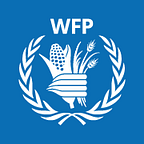‘It helps to know that we will always have something to eat at school!’
WFP’s mission is to ensure that all school aged children have access to school meals and are healthy and ready to learn.
By Stephanie Rigaud and Theresa Piorr
Every day, millions of children around the world go to school on an empty stomach — hunger affects their concentration and ability to learn. There are also millions of children — particularly girls — who simply do not go to school because their families need them to help in the fields or perform domestic duties.
Thanks to the support of partners like the United States Department of Agriculture (USDA), the World Food Programme (WFP) was able to assist more than 1,700 schools during the last school year in Haiti. Working with the Government of Haiti, providing daily hot meals encourage children to stay in school and eat at least one healthy balanced meal a day.
Love Chédeline, a 16-year-old student who is in the 7th grade at the National Mixed School of Corail in Haiti’s Grand-Anse department, explains to us how the school meals provide comfort in difficult times. Her family cannot afford to have all their children living with them, so Love Chédeline stays with her aunt, separated from her younger sister Florence.
“The school canteen is very helpful. At least like this I know that my sister will always have something to eat,” she tells us.
With the support from USDA and the McGovern-Dole Program, WFP has distributed almost 15 million meals to more than 110,000 children in three departments since September 2020. A fifth of these students live in earthquake affected areas.
“For a lot of us, the school meal is our first and only meal of the day. It helps to know that we will always have something to eat at school!”, Love Chédeline explains.
The support from USDA goes far beyond providing school meals: As part of the McGovern-Dole International Food for Education and Child Nutrition Program, WFP and partners can strategically promote improved literacy, health and nutrition of children.
A Teacher Coaching and Mentorship programme has proven to be very successful in providing the necessary tools for teachers and directors to deliver quality reading and writing instructions. The programme has had a significant impact — the average teacher attendance in implementing schools has increased from 50 percent to 80 percent in less than a year!
Advanced seminars on various topics such as lesson planning and preparation, phonemic awareness, alphabetic principles, and classroom management were organized by WFP’s implementing partner Catholic Relief Services (CRS) for teachers, enabling them to provide quality education to the students.
A holistic, evidence-based, early grade reading (EGR) and writing programme was implemented, using the “Map Li Net Ale Methodology” (MLNA), which was developed through close collaboration of the United States Agency for International Development (USAID), the Ministry of National Education (MENFP), and other education development partners. Students received new learning materials, facilitating their understanding and thus contributing to the overall improvement of literacy in Haiti. Teaching and learning materials include textbooks and Creole workbooks, guides and instruction materials for teachers and directors as well as a classroom library of 100 Creole and French reading books that are appropriate for early readers. Materials were designed to strengthen the ministry’s capacity to implement evidence-based reading approaches.
To promote better health through water, sanitation and hygiene (WASH) interventions, students took part in behaviour change initiatives to encourage them to adopt better hygiene practices while awareness sessions were held for actors of the educational system on how to best promote health and hygiene in schools. Thanks to USDA funding, 83 handwashing stations were installed in Haiti’s Grand-Anse, Nord and Nord-Est departments.
To enable long-term success and sustainability of the school feeding programme, USDA funding allows WFP to support the Ministry of Education with various capacity strengthening activities such as the “System Approach for Better Education Results” (SABER) — an exercise to analyse the government’s capacity to set-up and implement its own school feeding programme. The findings from these studies are being used to update the National School Feeding Policy that was published in 2015.
WFP aims to assist 471,000 children in Q3 2023. Based on current funding forecasts, WFP will only be able to reach 28,000 children in 2023/2024, which is a 92% decrease from this school year.
For the 2021–2022 academic year, more than 357,000 students received hot meals in Haiti every day thanks to our supporters from Canada, the Education Cannot Wait fund, France and USDA.
